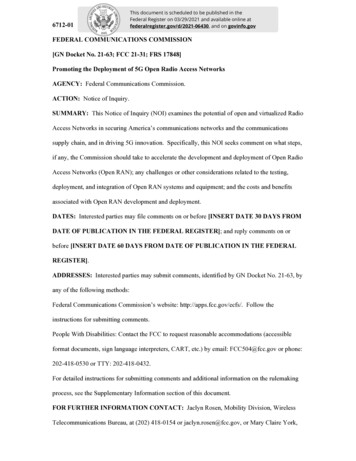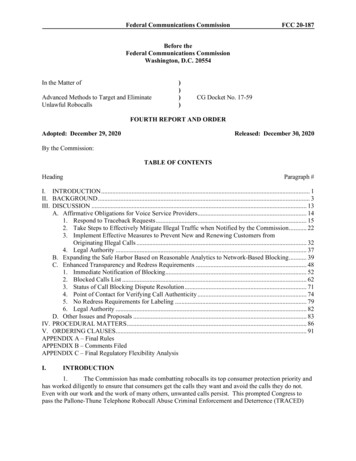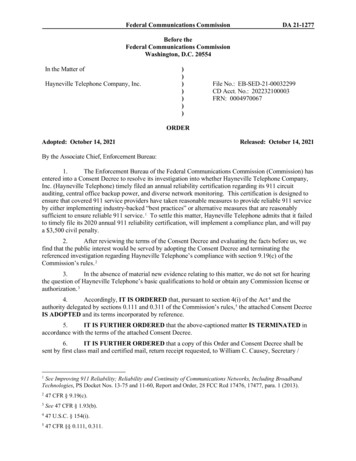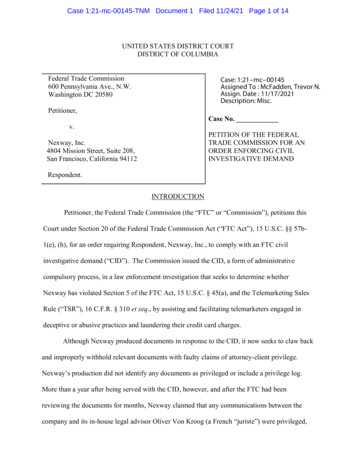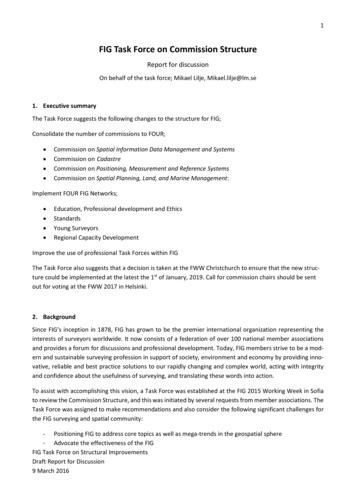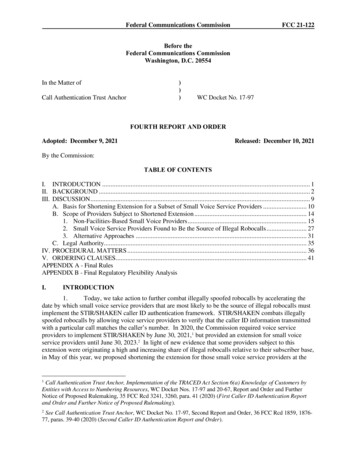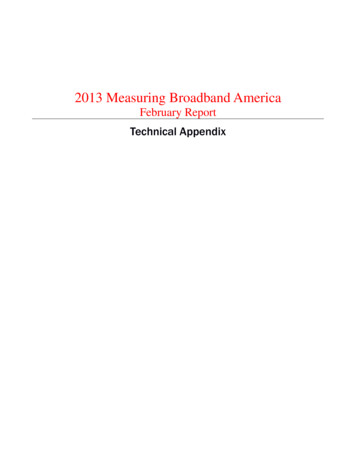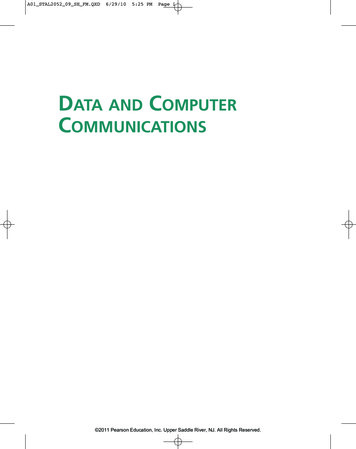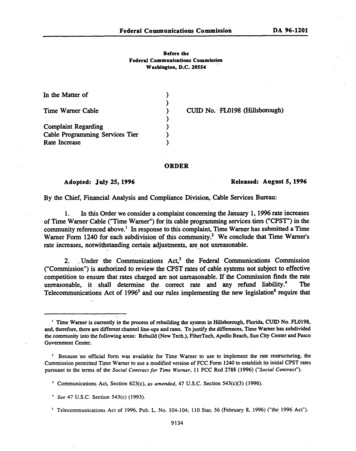
Transcription
Federal Communications CommissionDA 96-1201Before theFederal Communications CommissionWashington, D.C. 20554In the Matter ofCUE) No. FL0198 (Hillsborough)Time Warner CableComplaint RegardingCable Programming Services TierRate IncreaseORDERReleased: August 5,1996Adopted: July 25,1996By the Chief, Financial Analysis and Compliance Division, Cable Services Bureau:In this Order we consider a complaint concerning the January 1,1996 rate increases1.of Time Warner Cable ("Time Warner") for its cable programming services tiers ("CPST") in thecommunity referenced above.1 In response to this complaint, Time Warner has submitted a TimeWarner Form 1240 for each subdivision of this community.2 We conclude that Time Warner'srate increases, notwithstanding certain adjustments, are not unreasonable.2. .Under the Communications Act,3 the Federal Communications Commission("Commission") is authorized to review the CPST rates of cable systems not subject to effectivecompetition to ensure that rates charged are not unreasonable. If the Commission finds the rateTheunreasonable, it shall determine the correct rate and any refund liability.4Telecommunications Act of 1996s and our rules implementing the new legislation6 require that1 Time Warner is currently in the process of rebuilding the system in Hillsborough, Florida, CUID No. FL0198,and, therefore, there are different channel line-ups and rates. To justify the differences, Time Warner has subdividedthe community into the following areas: Rebuild (New Tech.), FiberTech, Apollo Beach, Sun City Center and PascoGovernment Center.2 Because "no official form was available for Time Warner to use to implement the rate restructuring, theCommission permitted Time Warner to use a modified version of FCC Form 1240 to establish its initial CPST ratespursuant to the terms of the Social Contract for Time Warner, 11 FCC Red 2788 (1996) ("Social Contract").3 Communications Act, Section 623(c), as amended, 47 U.S.C. Section 543(c)(3) (1996).' See 47 U.S.C. Section 543(c) (1993).5 Telecommunications Act of 1996, Pub. L. No. 104-104, 110 Stat 56 (February 8, 1996) ("the 1996 Act").9134
Federal Communications CommissionDA 96-1201complaints against the CPST rates be filed with the Commission by a franchising authority thathas received subscriber complaints. A local franchising authority ("LFA") may not file a CPSTrate complaint unless, within 90 days after such increase becomes effective, it receives subscribercomplaints. This standard requires more than one subscriber rate complaint. The provisions underthe 1996 Act became effective upon its enactment on February 8, 1996.7 The County ofHillsborough, the LFA, filed a complaint on June 6, 1996 for the community referenced above.8In its complaint, it has verified that it has received more than one subscriber complaint sufficientto trigger our jurisdiction to review its complaint.3.To justify rates for the period beginning May 15,1994, through a benchmark filingor a cost of service showing, operators must use the FCC Form 1200 series. Operators arepermitted to make changes to their rates on a quarterly basis using FCC Form 1210.9 Operatorsmay alternatively justify adjustments to their rates on an annual basis using FCC Form 1240 toreflect reasonably certain and quantifiable changes in external costs, inflation, and the numberof regulated channels that are projected for the twelve months following the rate change.10 Anyincurred cost that is not projected may be accrued with interest and added to rates at a latertime.11 If actual and projected costs are different during the rate year, a "true-up" mechanism isavailable to correct estimated costs with actual cost changes.12 The "true-up" requires operatorsto decrease their rates or alternatively permits them to increase their rates to make an adjustmentfor over or under estimations of these cost changes.13Inflation Calculation4.We note that each Time Warner Form 1240 filed with respect to the community inthis proceeding uses an inflation factor of 2.96%, which is the annual factor for the period July1,1994 through June 30,1995. However, each Time Warner Form 1240 reflects a true-up period6 See Implementation of Cable Act Reform Provisions of the Telecommunications Act of 1996, FCC 96-154(released April 9, 1996) ("Interim Rules").' See Communications Act, Section 623 (c), as amended, 47 U.S.C. Section 543(c)(3) (1996).' The LFA only filed complaints for the Rebuild, Fibertech, Apollo Beach and Sun City Center areas ofHillsborough, Florida, CUID No. FL0198.9 47 C.F.R. Section 76.922(b)(6); see also Second Order on Reconsideration, 9 FCC Red at 4189 n.195.10 In the Matter of Sections of the Cable Television Consumer Protection and Competition Act of 1992: RateRegulation, MM Docket No. 92-266, Thirteenth Order on Reconsideration, 11 FCC Red 388, 391 (1996)("Thirteenth Reconsideration Order")." Id. at 392.13 Id." Id.9135
Federal Communications CommissionDA 96-1201of only six months from July 1, 1995 through December 31, 1995. Thus, Time Warner used anannual inflation factor of 2.96% for a stated "true-up" period of six months.145.The Thirteenth Reconsideration Order provides a "true-up" mechanism which allowsoperators to correct differences between charges the operator has actually collected and chargeswhich reflect costs actually incurred by the operator. 15 In the instant proceeding, the rates whichwere deemed reasonable under the Social Contract as of August 3, 1995, the starting rate usedin each Time Warner Form 1240, did not include allowable inflation from July 1, 1994 to June30, 1995. Therefore, Time Warner could have properly claimed inflation for such period on eachTime Warner Form 1240. Thus, we will permit Time Warner to calculate inflation for the 12month period (January 1, 1995 to December 31, 1995), as reflected on each filed Time WarnerForm 1240. 16 Therefore, we make no adjustments to Time Warner's inflation factor and permitTime Warner to calculate inflation using the 12 month factor. 17Interest Calculation6.We have reviewed the Time Warner Form 1240 submissions, and have made anadjustment to the interest calculations. We have adjusted Time Warner's interest calculations toreflect the correct methodology to calculate interest, as shown in our corrected FCC Form 1240.18Our adjustments, however, have no impact on Tune Warner's maximum permitted CPST rates.Therefore, even with our correction for interest, Time Warner's current rates are below themaximum permitted rates pursuant to the Social Contract.1.Upon review of the record herein, we conclude that, notwithstanding ouradjustments, Time Warner has justified its CPST rate increase in each area.1914 The Time Warner Form 1240 did not reflect the change to the method for calculating inflation as reflected inthe FCC Form 1240 approved on December 15, 1995." 11 FCC Red 388, 392(1996)." Under the terms of the Social Contract, Time Warner's current CPST rates as adjusted for inflation and changesin external costs as of August 3, 1995 were deemed reasonable. Social Contract at Sec. HI. C. 3.17 Time Warner, of course, may request inflation-for the 6 month period (July 1, 1994 through December 31,1994) pursuant to our decision in Thirteenth Reconsideration Order." The error in calculating the interest was found only in the Instructions in the FCC Form 1240 approved onDecember 15, 1995 and involved three formulas on pages 19 and 20 of the Instructions. The formulas corrected onJanuary 19, 1996 in the FCC Form 1240 involved Line H4, option 1; Line H4, option 2; and Line H8." This finding is based solely on the representations of Time Warner. Should information come to our attentionthat these representations were materially inaccurate, we reserve the right to take appropriate action. This Order isnot to be construed as a finding that we have accepted as correct any specific entry, explanation or argument madeby any party to this proceeding not specifically addressed herein.9136
Federal Communications CommissionDA 96-12018.Accordingly, IT IS ORDERED, pursuant to Section 0.321 of the Commission'srules, 47 C.F.R. § 0.321, that the complaint referenced herein with respect to CUID No. FL0198,against the CPST rate increases charged by Time Warner in the franchise area referenced in thecaption during the period from January 1, 1996 to December 31, 1996 IS DENIED.9.Accordingly, IT IS ORDERED, pursuant to Section 0.321 of the Commission'srules, 47 C.F.R. § 0.321, that Time Warnefs January 1, 1996 CPST rate increases as set forthin Appendix A (plus franchise fee) are not unreasonable.FEDERAL COMMUNICATIONS COMMISSIONElizabeth W. BeatyChief, Financial Analysis and Compliance DivisionCable Services Bureau9137
Federal Communications CommissionAppendix AHillsborough, FLCUID No. FL0198Amount of Rate IncreaseRebuild (New Tech.) 2.96FiberTech 2.85Apollo Beach 3.11Sun City Center 2.879138DA 96-1201
in this order we consider a complaint concerning the january 1,1996 rate increases of time warner cable ("time warner") for its cable programming services tiers ("cpst") in the community referenced above.1 in response to this complaint, time warner has submitted a time warner form 1240 for each subdivision of this community.2 we conclude that
